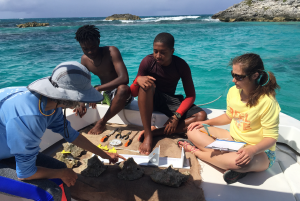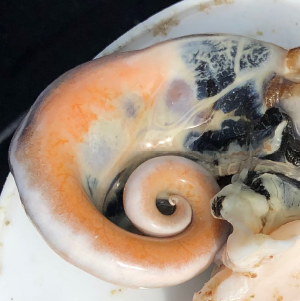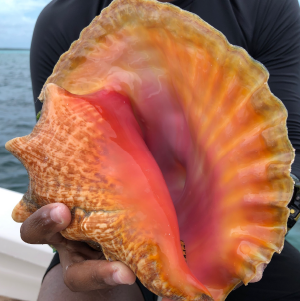7/28/2020
Saving the Queen Conch
By Lynda F. Rysavy
The glossy, pink queen conch is an iconic species of the Caribbean, yet decades of overfishing has caused their populations to plummet. “They are not doing well,” said Megan Davis, Ph.D., aquaculturist and research professor at Florida Atlantic University’s Harbor Branch Oceanographic Institute. But, she’s on a mission to prevent them from disappearing.
Davis attended Florida Institute of Technology in Melbourne and earned a Bachelor's degree in aquaculture and environmental science. After that, she spent 10 years in the Turks and Caicos Islands as a co-founder and chief scientist of the world’s first queen conch farm. Later, she earned a doctorate degree from Florida Institute of Technology and joined FAU’s Harbor Branch in 1996. She has over 40 years of experience in queen conch aquaculture and has operated six experimental conch hatcheries and the commercial conch farm. “The conch is part of who I am,” she said. Sharing her knowledge to ensure their survival is, “part of the gift that I want to give to the world.”
Originally from Australia, Davis lived in Miami during her high school years. She and her family would sail to The Bahamas and it was during these trips that she fell in love with the flamboyant sea snail that would shape her entire career — and life. She admired their beauty, taste and importance to The Bahamas and Caribbean. “They are an amazing animal,” she said. “They sit there and they do their work, grazing on seagrass and growing the most magnificent shell.”
While they may appear to be a passive snail, queen conch plays a vital role in the environment. Davis and her team developed an egg farm in a Bahamian marine protected area and translocated the adults into an overfished area. In this recent study, she and her graduate student found that reestablishing conch in an area had a positive effect on the entire ecosystem. “This vegan of the sea cleans the seagrass meadows and makes them healthier,” she said, which will attract more fish, sea turtles, sharks and other marine life.
Now, Davis is working in Puerto Rico to lead a National Oceanic and Atmospheric Administration supported pilot-scale conch hatchery. Davis and a co-investigator work with local fishers, to teach them how to grow the animals and then release them into the wild in a marine protected area. This adds jobs and diversified livelihoods for the fishing community, in addition to supporting conch conservation. She said she hopes it serves as a model to then, “take the technology, training and education and be able to transfer it to as many Caribbean islands as possible.”
When it comes to growing conch, Davis is committed to getting information out to as many people as possible and is working on writing a how-to manual. “You have the science of the conch, and the biology, but there’s also art and intuition with growing the animal,” said Davis. She’s looked at thousands and thousands of small conch over her 40-year career. “How do I take that information and help somebody else see it the way I see it. It’s exciting but also challenging.”
If you would like more information, please contact us at dorcommunications@fau.edu.
2019- The Bahamas Gallery
 Queen conch tagging
Queen conch tagging
 Queen conch gonads
Queen conch gonads
 Queen conch restoration
Queen conch restoration
